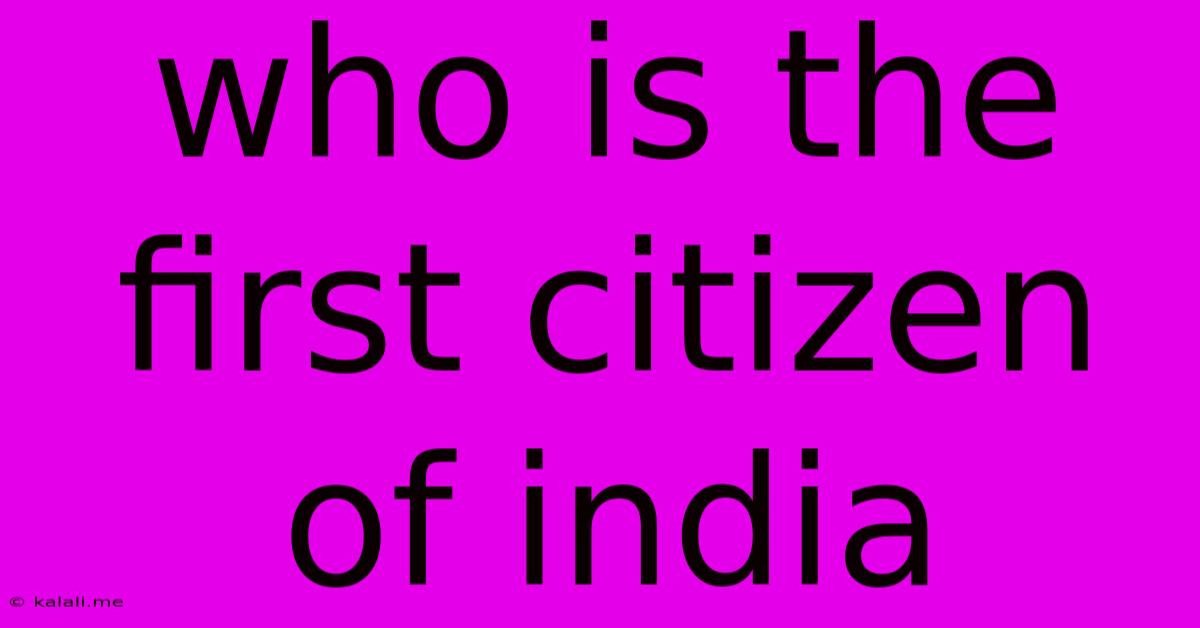Who Is The First Citizen Of India
Kalali
Jun 13, 2025 · 3 min read

Table of Contents
Who is the First Citizen of India? Unpacking the Title and its Significance
The title "First Citizen of India" might seem straightforward, but it carries significant weight and isn't as simple as it sounds. It's a symbolic title, representing the highest office in the land and embodying the ideals of the Indian nation. This article will delve into who holds this title, the constitutional basis for it, and the responsibilities it entails. Understanding the role of the First Citizen is crucial to grasping the functioning of India's democratic system.
The President of India: The First Citizen
The President of India is officially recognized as the First Citizen of the country. This isn't a position inherited through lineage but one earned through a meticulous electoral process involving the elected members of both houses of Parliament and the state legislative assemblies. The President acts as the head of state, a largely ceremonial but constitutionally significant role.
Constitutional Basis and Powers
The Indian Constitution outlines the President's powers and responsibilities in detail. While seemingly ceremonial, the President's position holds considerable influence. Key powers include:
- Appointing the Prime Minister: The President appoints the leader of the party or coalition with a majority in the Lok Sabha (Lower House of Parliament) as the Prime Minister.
- Appointing other Ministers: The President, on the advice of the Prime Minister, appoints other ministers to the Council of Ministers.
- Legislative Powers: The President has the power to summon, prorogue, and dissolve Parliament. They also have the power to give assent to bills passed by Parliament or withhold assent (although this is rarely exercised).
- Executive Powers: The President is the supreme commander of the Indian armed forces. They also have extensive executive powers in relation to the administration of the country.
- Judicial Powers: The President appoints the judges of the Supreme Court and High Courts. They also have the power to grant pardons, reprieves, respites, or remissions of punishment or to suspend, remit, or commute the sentence of any person convicted of any offense.
Beyond the Constitution: Symbolism and National Unity
Beyond the constitutional mandates, the President embodies the spirit of India. They represent the unity and diversity of the nation, acting as a symbol of national pride and integrity. The President's role extends beyond the political realm, serving as a figurehead for national celebrations and international diplomacy. They represent India on the world stage, fostering relationships with other countries and promoting India's interests globally.
The Significance of the Title
The title "First Citizen" underscores the principle of equality before the law. Although holding immense power, the President is subject to the Constitution and the rule of law, reinforcing the democratic ethos of India. It emphasizes that regardless of their position, everyone is ultimately a citizen of the nation, bound by its laws and striving towards its betterment. This title also reinforces the concept of a representative democracy, where the highest office is not inherited but earned through a democratic process.
In conclusion, the First Citizen of India, the President, plays a multifaceted and crucial role in the nation's governance and represents the unity and aspirations of its people. Understanding the President’s powers and symbolic significance is key to comprehending the complexities and nuances of India’s democratic system.
Latest Posts
Latest Posts
-
What Is The Science Of Mapmaking Called
Jun 14, 2025
-
Ts Diagram For Vapour Compression Cycle
Jun 14, 2025
-
Find The Output Of The Following Program
Jun 14, 2025
-
40 Percent Of What Number Is 60
Jun 14, 2025
-
What Is The Chemical Name For Chalk
Jun 14, 2025
Related Post
Thank you for visiting our website which covers about Who Is The First Citizen Of India . We hope the information provided has been useful to you. Feel free to contact us if you have any questions or need further assistance. See you next time and don't miss to bookmark.